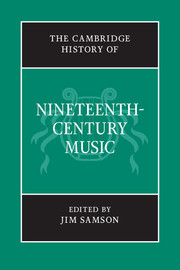Book contents
- Frontmatter
- Part One 1800–1850
- Part Two 1850–1900
- 11 Progress, modernity and the concept of an avant-garde
- 12 Music as ideal: the aesthetics of autonomy
- 13 The structures of musical life
- 14 Opera and music drama
- 15 Beethoven reception: the symphonic tradition
- 16 Words and music in Germany and France
- 17 Chamber music and piano
- 18 Choral culture and the regeneration of the organ
- 19 Music and social class
- 20 Nations and nationalism
- 21 Styles and languages around the turn of the century
- Chronology
- Institutions
- Personalia
- Index
- References
16 - Words and music in Germany and France
from Part Two - 1850–1900
Published online by Cambridge University Press: 28 March 2008
- Frontmatter
- Part One 1800–1850
- Part Two 1850–1900
- 11 Progress, modernity and the concept of an avant-garde
- 12 Music as ideal: the aesthetics of autonomy
- 13 The structures of musical life
- 14 Opera and music drama
- 15 Beethoven reception: the symphonic tradition
- 16 Words and music in Germany and France
- 17 Chamber music and piano
- 18 Choral culture and the regeneration of the organ
- 19 Music and social class
- 20 Nations and nationalism
- 21 Styles and languages around the turn of the century
- Chronology
- Institutions
- Personalia
- Index
- References
Summary
Few generalisations are safe, but the following one is perhaps more defensible than many others: the coming together of words and music is a Hydra-headed phenomenon, changeable from composer to composer, era to era, place to place, and it is always fraught with difficulties. Song is both natural, that is, an innate impulse (to heighten words by singing them precedes recorded history) and unnatural (words and music are two different sign-systems), and its agonistic tensions were the source of continuing debate in the later nineteenth century, especially given the commercial viability of the genre. Songs abounded: by the later decades of the century, the composer Peter Cornelius could rightly speak of an endless stream of Three Songs issuing from German music firms, while the immense girth of Ernst Challier’s Grosser Lieder-Katalog (Great Song Catalogue) of 1885 testifies to the proliferation which prompted Cornelius’s half-exasperated, half-rueful comment. He was, after all, a contributor to the floodtide, composing both song cycles (including Vater unser, Op. 2; Trauer und Trost, Op. 3; Rheinische Lieder, Op. 7; and the popular Weihnachtslieder, Op. 8) and individual songs. Whatever the assertions of singing ‘as the birds sing’ – so proclaims Goethe’s Harper in ‘Der Sänger’ (The Minstrel), a ballad replete with ironies – or of folklike naïveté, the nineteenth-century lied was never unselfconscious, and by this point it had its own history to contend with as well.
- Type
- Chapter
- Information
- The Cambridge History of Nineteenth-Century Music , pp. 460 - 499Publisher: Cambridge University PressPrint publication year: 2001
References
- 14
- Cited by



